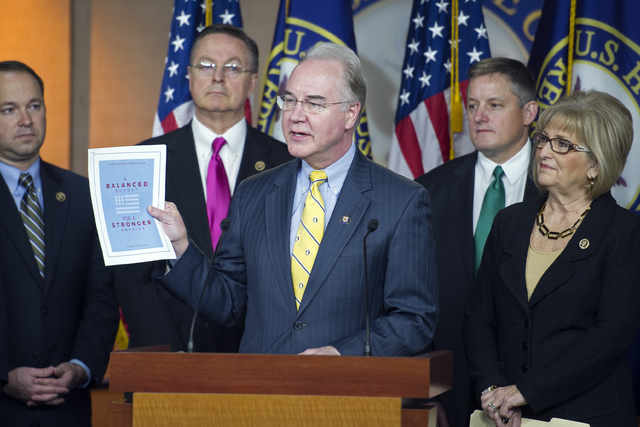WASHINGTON — Republicans in Congress advanced balanced-budget plans bristling with cuts in Medicaid and other benefit programs Thursday, determined to make a down payment on last fall’s campaign promise to erase deficits by the end of the decade. ADVERTISING WASHINGTON
WASHINGTON — Republicans in Congress advanced balanced-budget plans bristling with cuts in Medicaid and other benefit programs Thursday, determined to make a down payment on last fall’s campaign promise to erase deficits by the end of the decade.
Last-minute maneuvering to match Pentagon spending levels requested by President Barack Obama consumed GOP lawmakers in both the House Budget Committee and the counterpart Senate panel.
Yet the GOP’s focus also extended to deficit reduction, repeal of the health care law, an overhaul of the tax code and other budget priorities long advocated by conservatives in control of both houses of Congress for the first time in nearly a decade.
The Senate budget panel, chaired by Sen. Mike Enzi, R-Wyo., followed suit a few hours later, on a 12-10 vote that also fell along party lines.
Critics voiced their dissatisfaction in unsparing terms.
“What they are proposing is to cut programs for some of the most vulnerable people in this country — the elderly, children, sick low-income people” said Vermont Sen. Bernie Sanders, an independent who may run for president next year as a Democrat. “At the same time they want to give significant tax breaks to the wealthy and the large corporations.”
Both the House and Senate budget blueprints called for more than $5 trillion in deficit reduction over the next decade, the overwhelming portion of it coming from repeal of the health care law and savings from social programs including Medicaid, welfare, food stamps and Medicare. Details were sparse or, in some cases, non-existent.
There were differences in the two plans, to be sure.
For the third year in a row, House Republicans showed an eagerness to convert Medicare into a voucher-like program for individuals who enroll beginning in 2024, a change that would generate significant budget savings only in the longer term.
Even so, the prospect of such a major shift in the program that provides health care for 40 million seniors unnerved Senate Republicans, already eyeing the 2016 campaign in which they must defend their newly won majority. They omitted mention of it in their proposal.
Both blueprints envisioned an overhaul of the tax code, details to be determined later.
Red ink was projected to give way to a small surplus in 2024 in the House plan, and one year later under the Senate’s scenario.
Pentagon spending was controversial, improbably so for a party that has long enjoyed more favorable public ratings on defense than Democrats.
In both houses, though, defense hawks had to struggle with fellow conservatives for whom deficits were an equal concern.
Approval of the budgets in both committees would lead to votes next week in the House and Senate.
After that, the next steps would be for Republicans to produce a compromise, then turn that into legislation.
GOP officials concede their ability to do so is a test of their ability to govern.
It would also lead directly to a veto struggle with Obama, who has vowed to protect the health care law, and has frequently criticized GOP spending priorities since taking office.



